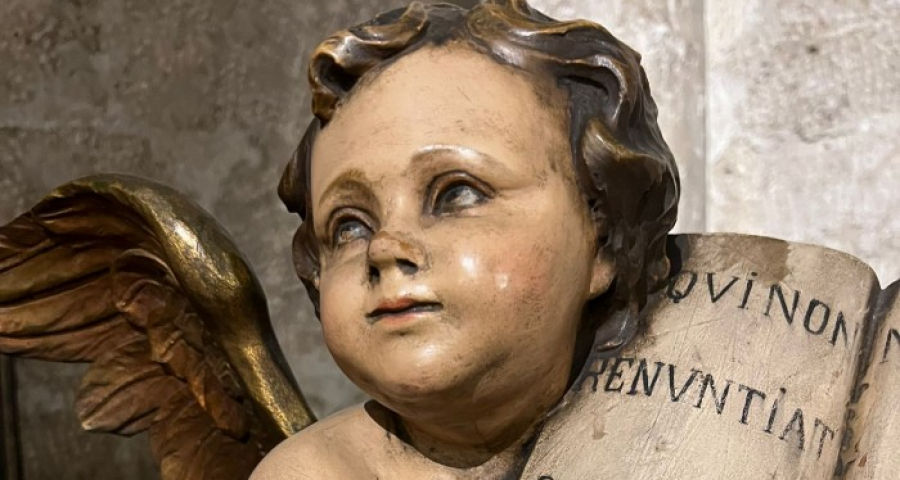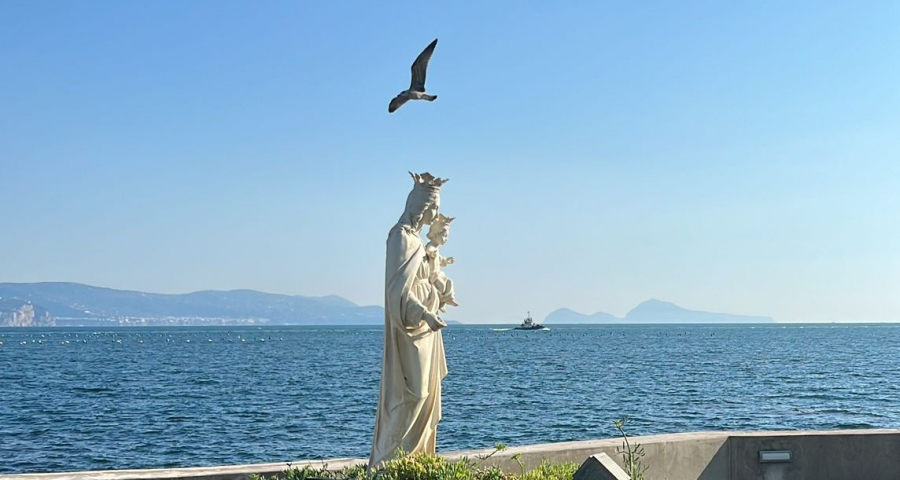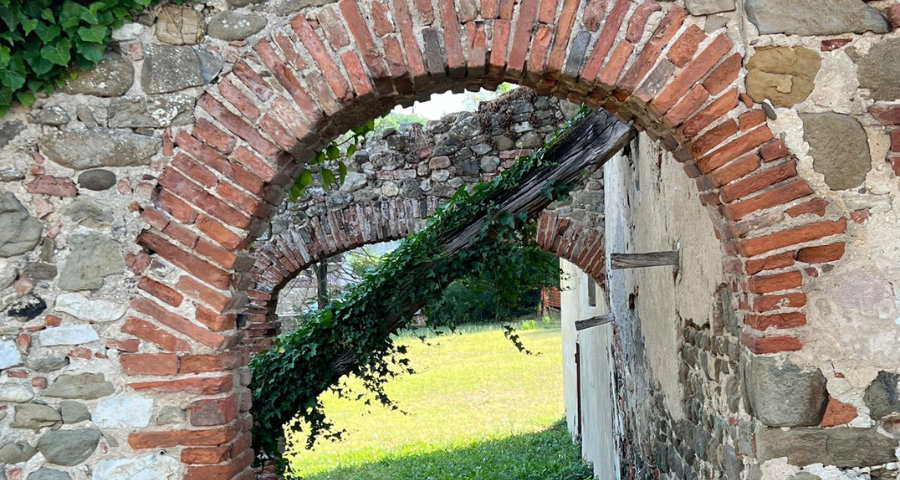The mystery revealed/5 - No empire lasts forever, only the care of the victims will be the beginning of a just kingdom
By Luigino Bruni
Published in Avvenire 01/05/2022
"God's yes on the cross is the judgment on successful man"
Dietrich Bonhoeffer, Ethics
Nebuchadnezzar's great dream and Daniel's interpretative capacity tell us something very true about the need for prophecy, which is not a utopia but a concrete space of the yet-to-be.
The dream of the Babylonian king Nebuchadnezzar is one of the most famous dreams in ancient literature. Daniel must not only interpret it, he must also recognize it in a vision without the king having told him so first. No soothsayer could therefore perform this double exercise: «Daniel replied, “No wise man, enchanter, magician or diviner can explain to the king the mystery he has asked about"» (The Book of Daniel 2,27). Daniel is not a magician like many others: «But there is a God in heaven who reveals mysteries. He has shown King Nebuchadnezzar what will happen in days to come» (Daniel 2,28). Hence, his miraculous ability to read dreams is not merely a technique: it is a gift from God.
In revealing the Daniel’s secret, the author of the book is then teaching us the difference in the Bible between a magician and a prophet. Astrologers, fortune-tellers, charmers, haruspices deal in trades, techniques, human affairs. They are talents that in various forms and intensities have always been present in communities, not only in the ancient world, where there have always been people capable of grasping the weak signals of life, of intuiting the deep traces of the collective soul and of people. Biblical prophecy, on the other hand, is entirely free. It is not a question of intelligence, wisdom or merit. The prophet is not any more cultured or wise than magicians and wise men; he has merely received by the ability to hear the voice of God and his spirit on earth by vocation: «As for me, this mystery has been revealed to me, not because I have greater wisdom than anyone else alive» (Daniel 2,30). The prophets are well aware that they have no merit for the function they perform; their only "merit" is not turning into false prophets.
Here, we finally arrive at the great, wonderful and terrible dream of the king, revealed to Daniel in a night vision: «“Your Majesty looked, and there before you stood a large statue - an enormous, dazzling statue, awesome in appearance. The head of the statue was made of pure gold, its chest and arms of silver, its belly and thighs of bronze, its legs of iron, its feet partly of iron and partly of baked clay. While you were watching, a rock was cut out, but not by human hands. It struck the statue on its feet of iron and clay and smashed them… the rock that struck the statue became a huge mountain and filled the whole earth» (Daniel 2,31-35). A gigantic statue, perhaps similar to the ones the Jews had seen in Babylon, which can also be found in much ancient Middle Eastern literature. A statue composed of five materials of degrading quality descending from the head of gold to the feet of clay - the theory of the four or five ages of history was known in many ancient cultures, including the Greek one. In the dream a boulder, without human intervention, detaches from the mountain and destroys the statue, and that demolition stone becomes a great mountain. After revealing the dream, Daniel also offers the king his interpretation: «"Your Majesty, you are the king of kings. The God of heaven has given you dominion and power and might and glory… You are that head of gold. After you, another kingdom will arise, inferior to yours. Next, a third kingdom, one of bronze, will rule over the whole earth. Finally, there will be a fourth kingdom, strong as iron... Just as you saw that the feet and toes were partly of baked clay and partly of iron, so this will be a divided kingdom… In the time of those kings, the God of heaven will set up a kingdom that will never be destroyed, nor will it be left to another people... it will itself endure forever. This is the meaning of the vision of the rock cut out of a mountain"» (Daniel 2,37-45).
The interpretations of this interpretation of Daniel could literally fill entire libraries. What were these kingdoms? Daniel tells us that the first golden one: it is that of Nebuchadnezzar ("you are that head of gold"). While there have been and still are many doubts regarding the other ones, even if many agree on the Medes (silver), Persians (bronze) and the Greeks (iron), a domain that after the death of Alexander would be divided into two parts: Seleucids (North) and the Ptolemaic kingdom (South). In the Middle Ages, mystics and theologians would periodically identify the fourth kingdom that was about to collapse into whatever empire was relevant at the moment, and Daniel's prophecy was thus updated with each generation. Because if the Bible is truly alive as we read it, and it is, the fifth kingdom is the one that is yet to come: the ram comes every day to save its child from death, every Good Friday it prays and invokes his resurrection. The past is neither the only nor the first time in the Bible. The king was stunned by Daniel's extraordinary results: «Then King Nebuchadnezzar fell prostrate before Daniel and paid him honour and ordered that an offering and incense be presented to him. The king said to Daniel, “Surely your God is the God of gods and the Lord of kings and a revealer of mysteries, for you were able to reveal this mystery"» (Daniel 2,46-47).
What can these dreams and these ancient interpretations still tell us? While the author was writing the Book of Daniel, his people were experiencing a time of great oppression, violence, persecution and disappointment. The Chosen People had known nothing but the oppression of stronger peoples who, one after the other had invaded them. Thus, a terrible question came to them: does it still have any sense to continue to have hope, to believe, to love our faith? Have we all deluded ourselves, have we all entered a collective bubble of vanity? In this context, Daniel's book was an attempt at finding a way out, as important in his time as it is in ours.
First, Daniel recognizes the possibility that even a pagan king, an invader and oppressor, can receive an authentic vision of God (Daniel 2,28). The Bible, which fought so hard against Babylonian idols and idolatry, tells us in the Book of Daniel that God can reveal himself even to an enemy. These are the pages that make the Bible immense. The gift of true prophecy can also be used to interpret the dreams and visions of an enemy. As Joseph did with the pharaoh and as it still happens every time that a person or a community is able to use their charisma not to interpret themselves and their dreams, but the dreams and mysteries of others. Even when these others are people who do not understand us or love us, but who oppress us and, without knowing it, would have an essential need of our charism to give a different meaning to their own dreams which in the end also concern us, which concern us all. There is perhaps no more true and pure gratuitousness than this: to make our gift the exegete of the dreams of those who have deported us into exile. We go ahead and do it, only by vocation, because we cannot not do it, without expecting any reciprocity. However, it is not uncommon that our enemies receive a blessing that ends up blessing us, too thanks to those nightmares revealed - where are the new Daniels today who instead of cursing the new Nebuchadnezzars of the world try to talk to them, and interpret their terrible dreams? These Daniels do not exist, and the kings kill all the wise men and the soothsayers, obsessed with their nightmares they proceed to destroy everyone and everything. Even bad kings can make "dreams" true, but without the help of an interpreter-prophet, dreams tend to spoil and go bad.
We do not know why Dante wrote the Divine Comedy, we do not know this of any great work. One reason, perhaps, was not too far from the spirit of the Book of Daniel. He too found himself in exile, he too was disappointed with and discouraged by his Florentine people, he too found himself in a "dark forest". Perhaps one day Dante understood that if earthly existence were the only court in history, if the only hells, purgatories and paradises were those on this earth, everything would be too unfair and wrong, and the poor would scream an inconsolable cry that would darken the whole universe. The "gap" of injustice in history would be unbearable, to us and even more so to God. The Divine Comedy and its second kingdoms were born from this pain and from this different demand for justice. This is why I was not surprised, a few days ago, to find Daniel in the XIV Canto in the Inferno - I expected it: «His head is fashioned of refined gold, and of pure silver are the arms and breast; then he is brass as far down as the fork. From that point downward all is chosen iron, save that the right foot is of kiln-baked clay, and more he stands on that than on the other» (Dante, Inferno, Canto XIV, 106-111). And so, I got a better understanding of Dante, and I got a better understanding of Daniel and his eschatology, that is, his need for a fifth kingdom. The realm of the yet-to-be, which is an earthly realm however- "filled the whole earth." It is the earth of women and men, of boys and girls. This is the great value of prophecy, which is not utopia because the land of the fifth kingdom is our land, that of our children, of our grandchildren. Not something else. Daniel's fifth kingdom is our kingdom of peace at last. An honest prophet also knows that it is not a realm of success, power and victory, and that it will come as a subtle wind of silence, and we will most probably not recognize it.
Daniel's eschatology is an entirely human need; it is the mother of all desires. Before being a religious matter, it is a civil, political, and economic issue: it is peace; it is an economy that feeds and does not starve; it is law and justice. It was born and reborn in exile, while being dominated, under the rubble. It was born on that day, during exile, when you have all but consumed all your tears for the wickedness of the powerful while devoured by their nightmares, and suddenly the soul flies to a higher mountain. From there, in vision, you witness the collapse of the terrible statue of the empires and you understand that all is vanitas, that all greater kingdoms come to an end, that no empire lasts forever, and you discover the transience of the scene of this world. Thus, a new peace comes to you, a different kind of pietas for those self-deluded kings; you feel another kind of consolation and you understand that this is not in vain. However then, on yet another day, you come down from the mountain. You leave the contemplation of the end and you return to the rubble generated by the nightmares of the powerful and their empires. You begin to take care of the victims, to rebuild a small part of this devastated land. And while waiting for the great stone and for the kingdom of the yet-to-be to arrive, you try to make that small corner of your desolate city a bit less unfair. The Fifth Kingdom has already begun.








_large.png)




